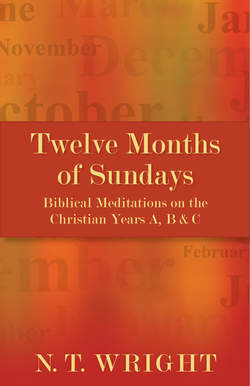Читать книгу Twelve Months of Sundays - N.T. Wright - Страница 52
На сайте Литреса книга снята с продажи.
ОглавлениеProper 11
Genesis 28.10–19a
Romans 8.12–25
Matthew 13.24–30, 36–43
To get the full flavour of the Pauline passage, hold in your mind the story of the children of Israel on their way through the wilderness, having left Egypt but not yet having arrived in the promised land. Paul’s vision of the Church in the present age is frequently informed by this picture (compare, for instance, 1 Corinthians 10). The crossing of the Red Sea is picked up in his thinking by the death and resurrection of Jesus; baptism, in which the Christian shares in that dying and rising, is the sign and seal of our liberation from slavery, and the starting point for the pilgrimage to our promised inheritance. This is one of the key ways in which Paul envisages the Christian life as both already and not yet redeemed: ‘we were saved’, he says (past tense), ‘in hope.’
Those ‘in Christ’ are thus ‘the children of God’; ‘Israel is my son, my firstborn’, says God through Moses to Pharaoh. They are led through the present wilderness by the personal presence of God himself in the Spirit, just as the Israelites were led by the pillar of cloud and fire. Instead of the Law on Sinai, they are given the personal, intimate prayer, Abba, Father (notice how the Lord’s Prayer occupies the centre of the Sermon on the Mount, Matthew’s New Sinai). And instead of a geographical territory as their ‘inheritance’, they are given – the world. All things belong to you, says Paul in 1 Corinthians 3.21. The entire cosmos will have its own Exodus (8.21), and will be your true inheritance.
Among the dozens of important lessons from all this, one of the most significant for today’s Western Christians is that we unlearn the idea that our destiny, our ‘inheritance’, is simply ‘heaven’, conceived in entirely otherworldly terms. The present world is good, and will be redeemed, just as our bodies are; notice that Paul distinguishes between ‘body’, which is more or less what we mean by ‘person’, and ‘flesh’, which is corruptible, rebellious, and will die for good. The imperatives of 8.12–15, seen from within the Exodus theme, mean ‘Don’t even think of going back to Egypt’; the point is that if the body will be redeemed, what you do in and with it in the present time matters. In the same way, if creation is going to be redeemed, rather than abandoned as in much sub-Christian thought, what we do in and with it here and now matters more than we have usually thought.
This setting explains well enough why the Christian pilgrimage involves suffering. We are not yet home, not yet shining like the sun, and the weeds still grow among the wheat. Like Jacob, we go out into the threatening unknown, with the vision of the risen Lord, promising us the inheritance, to inspire us on the long road ahead. And every place where the angels meet us becomes another house of God, another gate of heaven.
